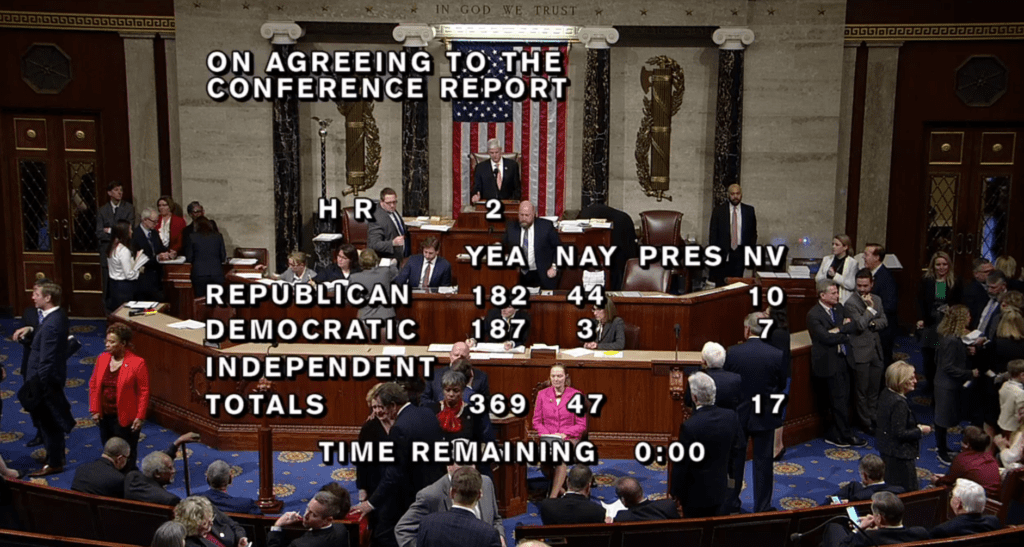Dec 12, 2018Specialty crop growers seeing support in approved farm bill
A farm bill full of support for specialty crop growers is headed to President Donald Trump’s desk after U.S. House of Representatives vote late Dec. 12.
The Agriculture Improvement Act of 2018 passed the House with an overwhelming majority of 369-47. The previous day, it passed the Senate 87-13 – the largest Senate majority vote in the history of the farm bill.


Sen. Debbie Stabenow is the ranking member of the U.S. Senate Committee on Agriculture, Nutrition, and Forestry, and one of the four leaders who negotiated the compromise needed to pass the farm bill before the end of the 115th Congress. Stabenow, a Democrat from Michigan, said in a phone call with media the bill supported a diversity of agriculture, and was a big win for Michigan, where berries, tree fruit and vegetables are vital parts of the economy.
“We grow some of everything, and it’s a very important part of our economy,” she said. “So, for me, I care about every part of the farm bill.”
The farm bill governs and funds a variety of federal agriculture programs for the next five years. Many of the renewed programs, such as the Specialty Crop Block Grant, will continue to support specialty crop agriculture. Other new provisions include an expanded crop insurance program for fruit and vegetable growers, Stabenow said. The Specialty Crop Farm Bill Alliance identified nine separate things in the bill that would benefit its members.
Phil Korson, president of the Cherry Marketing Institute, said there were several provisions in the bill benefiting tart cherry growers, including language establishing food grade standards for imported tart cherry products. Michigan dominates U.S. tart cherry production but cheap imports have remained a concern for many growers.
The specialty crop grants are a vital part of how specialty crop research is funded, he added. And the farm bill’s crop insurance provisions are important.
“We still have the ability to protect our growers who are taking those risks,” Korson said. He also credited Stabenow for establishing “Specialty Crops and Horticulture” as one of the farm bill’s 12 titles or chapters in the 2014 farm bill as well keeping it in the 2018 legislation.
“Hats off to Senator Stabenow for seeing the need for a new Specialty Crop title,” Korson said. The legislation provides support for specialty crop growers by continuing $2.4 billion in permanent investments in research, pest management, and promotion of fruits and vegetables, according to her office.
House Committee on Agriculture Chairman K. Michael Conaway, R-Texas, said in his opening remarks on the Hour floor that the bill included investments in specialty crops, including fruits and vegetables.
The farm bill technically expired in September, and passage of the bill has been somewhat delayed the negotiators sought to reach a compromise over food stamps reform proposed by House Republicans and other issues.
Conaway acknowledged “philosophical differences” with other conference committee members such as “commonsense SNAP reforms, preventing wildfires, and providing regulatory relief” but urged other representatives to pass the farm bill as it was.
“Ultimately, I had to make a decision between making as many inroads on reform in these areas as I could OR allow farmers and ranchers to be held hostage,” he said. “Faced with that choice, I chose the route of getting this farm bill done.”
The Specialty Crop Farm Bill Alliance, which represents more than 120 specialty crop organizations across the United States, released a list of items in 2018 farm bill that benefit its members:
- Enhanced funding for the Specialty Crop Research Initiative (SCRI), allowing all specialty crops to compete for the full $80 million annually for the SCRI program.
- An annual trust fund of $25 million annually to maintain resources for the citrus industry for combating citrus greening.
- Full $9 million annual funding of the Technical Assistance for Specialty Crops (TASC) program, which encourages reduction of bureaucratic impediments to make the program more efficient in overcoming trade barriers.
- Continued support for programs that combat invasive pests and diseases at $75 million annually, with the goal of enhancing its funding in five years by $7.5 million to fund the National Clean Plant Network.
- Increased Food Insecurity Nutrition Initiative (FINI) funding levels and continued support for the Supplemental Nutrition Assistance Program (SNAP).
- Continued strong funding of Specialty Crop Block Grants (SCBG).
- Improved access to foreign markets through increased funding for the Market Access Program (MAP) of at least $200 million annually.
- Strong language in SCRI, AFRI and the newly created AGARDA program focusing on mechanization as a priority.
- Reforms to the National Organic Program (NOP) operation.
Other public officials and industry leaders weighed in on the legislation:
Stabenow was joined on a media call by Carl Bednarski, president of the Michigan Farm Bureau, who said passage of the farm bill would provide stability to growers, some of whom are facing very difficult times.
“This farm bill couldn’t come at a more appropriate time,” he said. “The risk management tools are so important for farmers.”
U.S. Secretary of Agriculture Sonny Perdue said in a released statement the legislation provides a strong safety net for farmers.
“This farm bill will help producers make decisions about the future, while also investing in important agricultural research and supporting trade programs to bolster exports,” he said. “While I feel there were missed opportunities in forest management and in improving work requirements for certain SNAP recipients, this bill does include several helpful provisions and we will continue to build upon these through our authorities.”
Robert Guenther, Senior Vice President of Public Policy for the United Fresh Produce Association, applauded the House and Senate “for the passage of a Farm Bill that includes the priorities of United Fresh and our members.”
“Our specialty crop producers provide consumers with healthy eating options every single day,” said John Keeling, executive president and CEO of the National Potato Council. “By expanding the consumption of fruits and vegetables, bolstering research and pest management and supporting grower initiatives to improve competitiveness, we are feeding our country and the world.”
“We appreciate the bipartisan support of lawmakers and the leadership of the House and Senate agriculture committees in moving this important legislation across the finish line in Congress,” said Mike Stuart, chief executive officer of the Florida Fruit & Vegetable Association. “This bill is good news for consumers as well as specialty crop producers. It invests in programs to ensure schoolchildren are eating nutritious produce. It also will help specialty crop agriculture fight plant pests and diseases such as citrus greening. And it bolsters programs that helps us expand markets for our crops.”
“The Alliance is grateful for the overwhelming support of specialty crops in the Farm Bill and for Congress continued commitment to policies that are tremendously important to the industry,” said Tom Nassif, president and CEO of Western Growers Association. “We strongly urge the President to recognize the value Congress sees in these crucial programs, and sign into law by the end of the 2018 session.”
“We are very pleased with the support of the Georgia delegation to pass this critical legislation for our growers and all of American agriculture. We appreciate the hard work of those members of the Agriculture Committee that drafted this legislation to ensure assistance and support of the fruit and vegetable industry,” said Mike Bruorton, president of the Georgia Fruit and Vegetable Growers Association. “This bill is a win-win for both the American consumer, to ensure they have access to nutritious fruits and vegetables, and to our GFVGA members to help with programs that support our industry. We truly appreciate the members of the Georgia delegation and their support in passing this critical legislation.”
– Stephen Kloosterman, VGN Associate Editor
Top Photo: A screen capture of live video feed of the U.S. House of Representatives’ vote on the 2018 farm bill. Photo: Clerk of the U.S. House of Representatives















